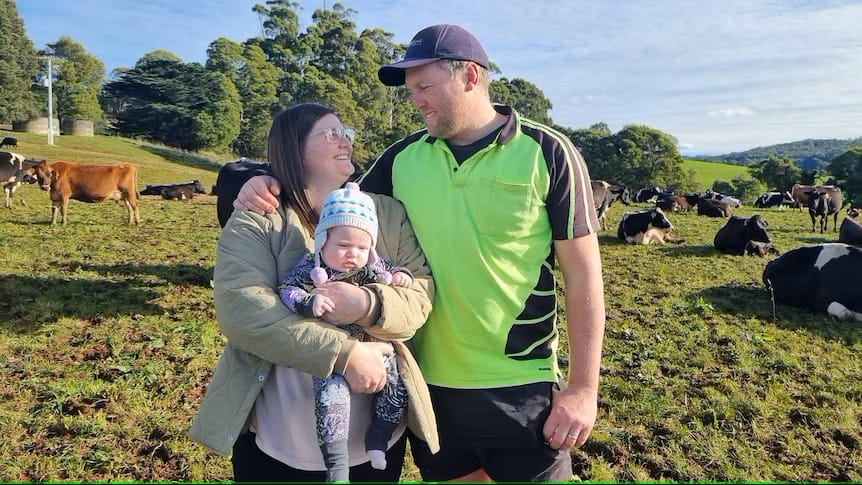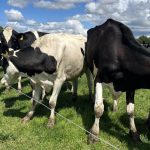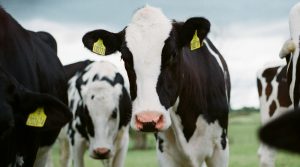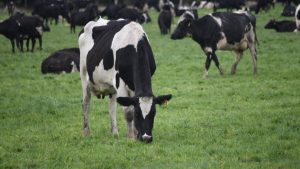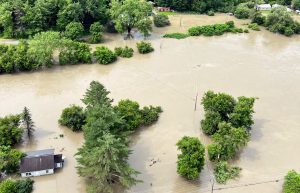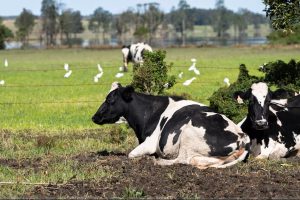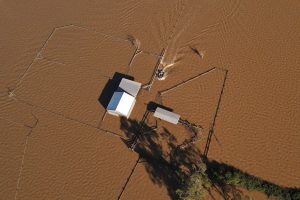
Nathan and Cassidy Lawrence waited 15 years to get into Tasmania’s expensive agricultural property market — and they never expected to run the farm they worked on as a young couple.
The duo lived and worked as farm hands on a cosy dairy farm at Flowerdale in North West Tasmania for more than a decade.
The region has the highest median price per hectare for farmland in the country at $25,580 per hectare, according to Rural Bank’s 2023 Farmland Values report.
With little-to-no money in their pockets, and no family property to lean on, the first-generation farmers knew their dreams of one day owning land were a long way off.
But the Lawrence family’s lucky break came about 18 months after the farm they worked on was sold, when the new owners offered them a sharefarming arrangement.
The arrangement involved managing the business for owners Stephen and Karen Fisher, while owning the livestock themselves.
“We felt like we were coming home,” Mrs Lawrence said, with a laugh.
“You need really good landowners for that opportunity to come up, and it doesn’t come up very often.”
Paying it forward
Just last month the pair were named Sharefarmers of the Year at the Tasmanian Dairy Awards.
And thanks to money earned raising livestock, the couple recently took their first steps into property, going halves in a second farm with the Fishers.
While that may one day help them buy the farm they live on, they have other plans they would like to get to first.
The Lawrences are keen to pay their own good luck forward by helping other young people into sharefarming too.
“It is such a hard industry to get into,” Mrs Lawrence said.
“So, it’s nice if we can give back like Karen and Steven do.”
Love thy neighbour
Just down the road, another young first-generation farmer knows what it’s like to get a foothold into a near-impossible market.
About seven years ago, Rob Arvier was working full-time interstate while managing a small lifestyle block in his hometown of Penguin.
With no access to water or machinery — and limited borrowing power — there was “no way” Mr Arvier could start farming full-time on his own land.
That was until his neighbour Wendy Sullivan offered him management of her 40ha property, after her husband John passed away.
“She gave me a lease that I paid in arrears instead of in advance, and that’s what got everything going,” the young farmer said.
“Sadly Wendy passed away last year, really unexpectedly … we’re really grateful for what she’s done for us.”
A leg up into an empire
From that start, Mr Arvier and his growing team of employees have expanded out of the paddock and into a diverse agribusiness, largely thanks to join joint-venture contracts and partnerships.
As well as running a 250ha mixed cropping farm, the business also owns and operates a specialty grocer and espresso bar in town, aimed at connecting customers with the source of their produce.
The business also opened a factory this year in Victoria that recycles by-products from a baking facility into fertiliser and stockfeed.
Despite his success, Mr Arvier believes he could never have achieved any of it alone.
“I don’t think I can point to anyone in our industry that hasn’t built a business without collaboration with other businesses or intergenerational wealth,” Mr Arvier said.
“You have to develop a diverse skill set and operation to succeed unless you’ve inherited a sizeable portion of land and water to attract lenders.
“There’s amazing young people all over the country that I think would make a huge impact but can’t enter primary production — and it’s something that needs to be addressed.”
